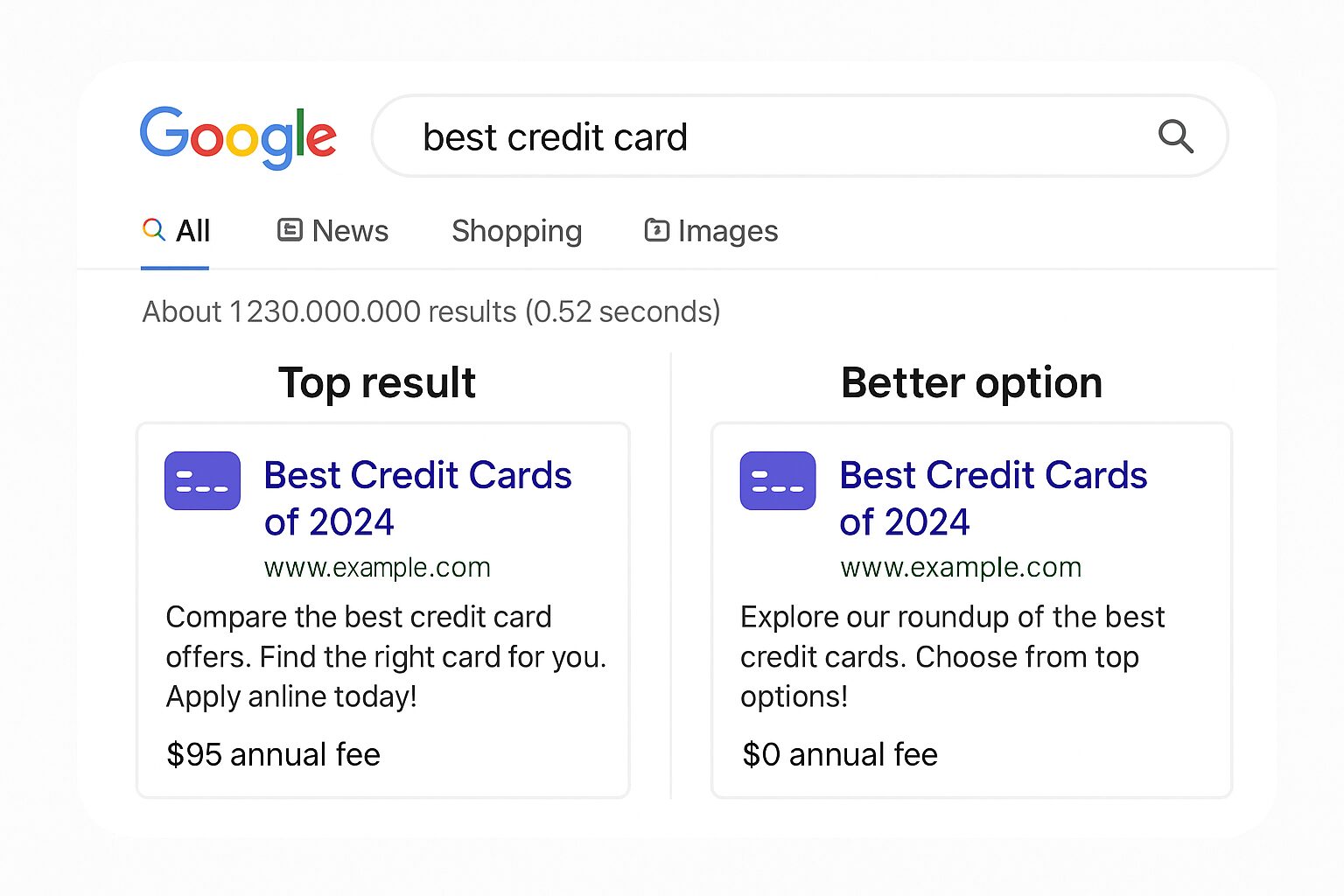More people trust the top results on Google than they probably should. A recent WalletHub study shows that when consumers follow those first-page picks blindly, especially for financial products and they end up often paying way more than they should for it. That’s not just a hit to individuals, it’s a warning for every business: if you are not optimizing your site, you are letting misinformation win and losing out on customers. The cost of bad SEO isn’t abstract; it hits individuals and brands alike.
Below I break down what WalletHub found, why good search engine optimization (SEO) matters more than ever and what business leaders should be doing now.
How Bad Search Results Cost Consumers and Why It Matters
WalletHub compared top Google results for search terms like “best 0% APR credit cards” with what the actual best options in the market are.
- Trusting the first-page websites on Google costs people $341 on average.
- If you follow biased credit card company recommendations, that loss is about $266.
- Reddit’s top pages? People lose about $568 by following those without digging.
- Worst option on page 1? That can cost over $600 more.
What all that means: many “top results” aren’t top quality. Sometimes they are paying to play, sometimes they simply ignore options and often they don’t match what people are really trying to find. Following recommendations from companies or Reddit shows how search engine rankings bias can lead people to poor choices.
People tend to trust organic results more than ads, but when both are biased or misleading, organic search vs paid search trust becomes a confusing blur.
Why Good SEO Is No Longer Optional
- Lost trust: People assume Page 1 = the best info. When it’s not, that expectation breaks down. Word spreads and your credibility take a hit.
- Missed revenue: If potential customers don’t find you or find someone else first, you lose sales. More than that, you lose influence over how people understand what you are offering.
- Misinformed consumers: If bad info dominates, people will choose products or services that are not right for them. That hurts them, and eventually it hurts the market. Consumer backlash could force regulation or shift trust away from businesses altogether.
- Brand awareness suffers: Beyond direct sales, being invisible in search means your brand isn’t being seen. When people do need what you offer, they might not even know you exist.
If you are a small business owner, having strong SEO strategies for small businesses is essential, not optional.
What Businesses Must Do to Win Back Users and Save Money
You can’t control Google’s algorithm. But you can control how you show up and whether you help people find what they actually need.
Here are concrete steps:
Audit how you perform for key search terms
- Identify what your customers actually search for not what you want them to search for.
- Use keyword research tools or market insight platforms to see which of those terms you rank well on, which need improvement. One smart place to start is with an SEO audit checklist.
Make content that meets intent
- If someone searches “best low interest credit card,” don’t just list cards you offer. Compare broadly. Be transparent. Show both pros and cons.
- Help them make an informed decision. You should understand how to improve search intent content, meaning your articles match what people are really trying to find when they search.
Avoid bias, disclosure problems, or hiding alternatives
- If you are publishing recommenders or reviews, make clear if any are “paid,” affiliate links, or tied to partnerships. Don’t exclude solid options just because they are not affiliates. One of the SERP mistakes to avoid is relying solely on sponsored placements.
Invest in SEO basics
- Speed: fast load times matter.
- Clean structure: headings, meta descriptions, readable URLs.
- Mobile: most people search on phones. Ensure your site follows mobile SEO best practices.
- User experience: if people click and bounce, that sends signals. Speed, mobile, and layout are more than technical. They affect user experience and SEO, which Google increasingly values.
Track what matters
- Monitor not just traffic, but conversions, bounce rates, and whether people finding you via Google are satisfied. Also monitor ‘lost opportunities’ search terms you should rank on but don’t.
Bottom Line
People are paying hundreds more than they need because search results are often biased, unclear or just wrong. If your website isn’t built to show up for the right terms and built to serve real user needs, you are not just missing profit but you are contributing to a problem: misinformation, distrust and wasted money.
If you care about your customers, your reputation or your bottom line, SEO isn’t an optional add on, it is foundational.
